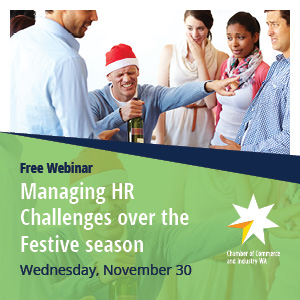The festive season is upon us and that means end-of-year celebrations. CCIWA Employee Relations Adviser Simona Sukoska outlines your responsibilities and how to get prepared.

With the festive season almost here, many businesses are ready to start planning their end-of-year celebrations. Despite all the tinsel and tapas, these functions are still considered work-related events and that means you’re still obligated to ensure your staff and those within the vicinity are safe.
Given the recent updates to Workplace Health and Safety legislation, it is recommended you plan ahead to avoid festive fumbles that could put your business and staff at risk from claims.
Below are a number of recommendations to help mitigate risk moving into the season’s celebrations:
-
Have a clear start and finish time
The event should have a designated start and finish time. This ensures that employees are reminded they are still on work time. Therefore, any time after the official end is not considered time worked.
-
Have your reasonable person
It is recommended to have someone volunteer to be a responsible individual. The individual will help keep an eye out on any behaviours that may be of both physical and, or, psycho-social risk. A call out for a reasonable person should ideally be conducted several weeks before the event.
-
Formalise your function
When you confirm dates, times and event details it is important to send a formal reminder to staff with clear standards of behaviour expected during workplace functions and the ramifications of failing to follow such standards (i.e. disciplinary consequences as provided within your relevant policies).
Other Resources
-
Policies
Ensure you have up-to-date policies attached when sending correspondence to staff. The most common policies include those relating to code of conduct, sexual harassment, bullying, and workplace health and safety.
-
Before the big day
It is important to send out an email before the event emphasising the required standards and expected behaviours. It serves as a reminder to staff of disciplinary actions if they do not continue to respect workplace standards at the event.
-
Home time
Ensure there is a safe way for employees to get home, especially those who have been consuming alcohol. Ideally, someone (i.e. reasonable person) should stay with the employee until it can be reasonably taken that they are OK to be taken safely home in a taxi, or other form of transport.
Legal considerations
It is important for businesses to understand that there can be legal implications if clear expectations of behaviour are not set. These can include claims like:
Unfair dismissal claims
If an employee believes their termination was unreasonable, harsh, or unjust (As seen in the case example Sione Vai v ALDI Stores).In this case, the Fair Work Commission rejected Vai’s unfair dismissal claim on the basis that his behaviour at an ALDI Christmas party, including throwing a glass across the room, warranted ‘misconduct’ in that it caused serious and imminent risk to the health and safety of those in the vicinity.
It emerged that although the employee pre-drank in his own time, and there were no managers in attendance, the party itself was still funded by ALDI and therefore a ‘work event’.
The core takeaways include the need to put in place solid boundaries around alcohol consumption; clear guidelines on expected conduct; and a need to organise these events in a way where you mitigate the crossover of personal events (pre-drinks) and work drinks.

Stop sexual harassment/bullying order
Employees may apply to the Fair Work Commission for a stop sexual harassment/bullying order.
Bullying under the Fair Work Act 2009 (Cth) (FW Act) includes repeated unreasonable behaviour towards another worker or group of workers, that creates a risk to health and safety.
Some examples are:
- verbal bullying e.g. teasing, name calling, insults;
- physical bullying e.g. taunting an employee by stealing their belongings and hiding them, shoving them, standing over them and intimidating them repeatedly; and
- excluding and targeting an employee/group of employees.
Under the FW Act, sexual harassment is defined as:
- an unwelcome sexual advance;
- an unwelcome request for sexual favours; or
- other unwelcome conduct of a sexual nature in relation to another worker.
Some forms of sexual harassment may also be considered bullying if the behaviour is repeated, ongoing and unwanted. Examples of sexual harassment can include:
- unwelcome physical contact;
- jokes, emails, and comments of a sexual nature;
- staring or leering;
- questioning a person's personal life by asking intrusive questions; and
- brushing/touching of person intentionally.
General protection claims
If an employee believes they are adversely affected by having raised a workplace right or complaint, they may be able to apply for general protections claim.
To find out more information, call the Employee Relations Advice Centre at CCIWA on 08 9365 7660 or email [email protected].




